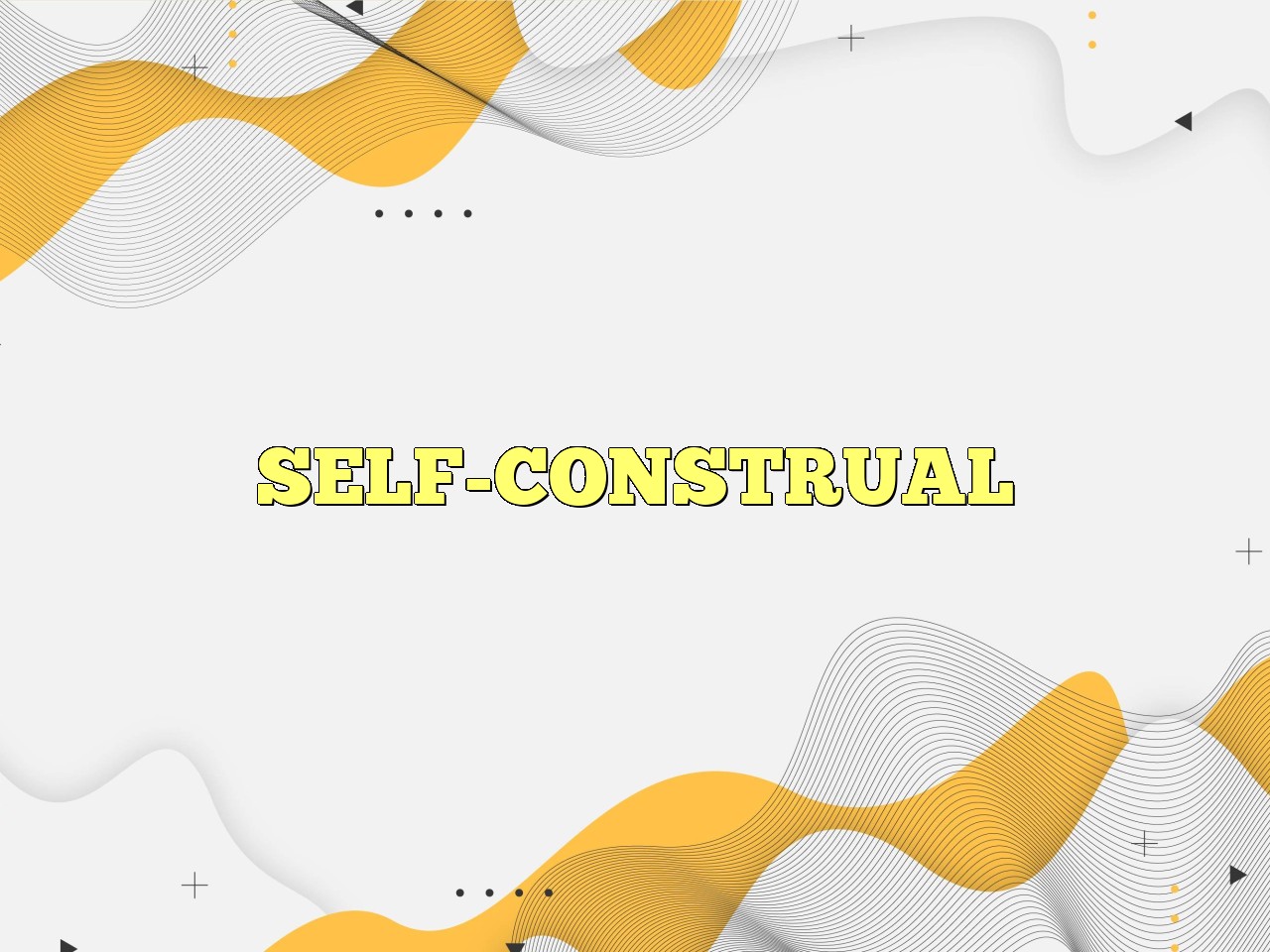5 Ways Define Self Construal

The concept of self-construal is a fundamental aspect of social psychology, referring to the way individuals perceive and understand themselves in relation to others. Self-construal is not just about how we see ourselves, but also about how we define our place within social contexts, influencing our behaviors, attitudes, and relationships. Over the years, researchers have identified various dimensions of self-construal, particularly highlighting the distinction between independent and interdependent selves. However, the complexity of human identity and the diversity of cultural influences suggest that self-construal can be defined and understood in multiple, nuanced ways. Here are five approaches to defining self-construal, each offering insights into the multifaceted nature of self-perception and its construction:
1. Independent Self-Construal
Individuals with an independent self-construal tend to define themselves by their internal attributes, such as personality traits, abilities, and preferences. They see themselves as unique entities, distinct from others, and their sense of self is derived from their personal characteristics, achievements, and autonomy. Cultures that emphasize individualism, such as many Western societies, often foster an independent self-construal. People with this self-construal value self-reliance, freedom, and personal expression, and they tend to prioritize their individual goals and needs over group harmony or obligations.
2. Interdependent Self-Construal
In contrast, those with an interdependent self-construal define themselves in terms of their relationships with others and their place within social groups. Their sense of self is deeply connected to their roles, responsibilities, and obligations within these groups. Interdependent self-construal is more commonly found in collectivist cultures, where the emphasis is on harmony, cooperation, and the well-being of the group over individual desires. Individuals with this self-construal prioritize maintaining social harmony, fulfilling duties to others, and seeking feedback from others to define their self-worth.
3. Relational Self-Construal
Relational self-construal highlights the importance of close relationships in defining one’s sense of self. According to this perspective, individuals understand themselves through their significant relationships, such as friendships, family ties, or romantic relationships. The relational self-construal emphasizes the interconnectedness of personal identities and the mutual influence that occurs within these relationships. This approach recognizes that our selves are not isolated entities but are shaped and expressed through our interactions and connections with others.
4. Collective Self-Construal
The collective self-construal involves defining oneself as part of a larger collective or group, where the group’s identity, values, and goals are integral to one’s personal identity. This self-construal is not just about the individual’s relationships with others but about seeing oneself as an integral part of a community or social category. The collective self-construal is significant in understanding how individuals derive a sense of belonging, purpose, and meaning from their membership in groups, whether these are based on nationality, profession, hobby, or any other shared identity.
5. Contextual Self-Construal
Finally, the contextual self-construal suggests that the definition of self is highly dependent on the specific situation or context in which an individual finds themselves. According to this view, individuals have multiple selves, each relevant to different social contexts, roles, or relationships. The contextual self-construal recognizes the dynamic and adaptive nature of self-construal, highlighting how individuals adjust their self-perception and presentation based on the demands and norms of various social situations. This approach underscores the complexity and flexibility of human identity, challenging the idea of a fixed or singular self.
In conclusion, these five definitions of self-construal illustrate the complexity and diversity of how individuals perceive and understand themselves. Each approach offers valuable insights into the construction of self, from the internal attributes and personal achievements emphasized by independent self-construal to the relational, collective, and contextual factors that influence our sense of identity. Understanding these different dimensions of self-construal can provide a deeper appreciation of human psychology and behavior, as well as the cultural and social factors that shape our selves.
How does culture influence self-construal?
+Culture plays a significant role in shaping self-construal, with individualistic cultures often fostering independent self-construal and collectivist cultures promoting interdependent self-construal. Cultural values, norms, and practices influence how individuals define themselves and their relationships with others.
Can individuals have both independent and interdependent self-construals?
+Yes, individuals can exhibit both independent and interdependent aspects of self-construal, depending on the context or situation. This flexibility allows individuals to navigate different social environments effectively and to adapt their self-presentation accordingly.
How does self-construal impact relationships and social interactions?
+Self-construal significantly influences how individuals engage in relationships and social interactions. For instance, those with an interdependent self-construal may prioritize harmony and mutual support, while individuals with an independent self-construal may focus on personal autonomy and expressing their unique perspectives.
Understanding the various definitions and dimensions of self-construal can enrich our appreciation of human diversity and complexity, highlighting the dynamic interplay between the individual, their social context, and their sense of self.

